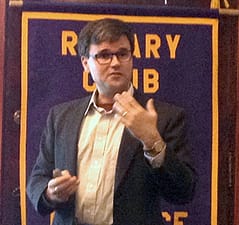 Dr. Paul Atchley, Associate Professor of Psychology at the University of Kansas, worked hard to dispel myths about distracted drivers when he spoke to the Lawrence Central Rotary on January 22, 2014. Atchley conducts research as a part of the KU Transportation Research Institute that focuses issues of vision and attention related to driving. In his presentation he pointed out a few myths about technology and driving today.
Dr. Paul Atchley, Associate Professor of Psychology at the University of Kansas, worked hard to dispel myths about distracted drivers when he spoke to the Lawrence Central Rotary on January 22, 2014. Atchley conducts research as a part of the KU Transportation Research Institute that focuses issues of vision and attention related to driving. In his presentation he pointed out a few myths about technology and driving today.
Myth #1: Everyone talks on the phone while driving, so it must be ok to do it.
Atchley declares that the probability of being in a car crash goes up 400% if the driver is distracted by texting, talking on a cell phone, or even talking to a passenger in the car. And he has the statistics to back it up!
Myth #2: When people know the risks, they will change.
So why do people persist in dangerous behaviors? Atchley says that the human brain deceives us into unrealistic expectations about our own abilities. He gave a number of examples to demonstrate that seeing is not just a visual capacity, it is a process of “attending.” And everyone thinks they are better at it than they really are!
Myth #3: Multitasking.
Atchley reminded club members that when traffic gets heavy, usually the driver of a vehicle stops conversation and both the driver and the passenger focus on other the cars around them. If a driver is listening to the radio or a book on tape, he probably will miss a chunk while navigating a difficult traffic situation. No one can do two things at once, not even talking and driving.
So certainly we won’t make a phone call from our car on the way home from the meeting. Another myth! Our attitudes are disconnected from our actions. Most of us won’t change the way we behave.
So what do we do? Atchley’s solution to stopping distracted drivers is “education and enforcement.” He and others conducting research have the story to tell. The next step is to enact tougher laws against the use of cell phones in moving vehicles.